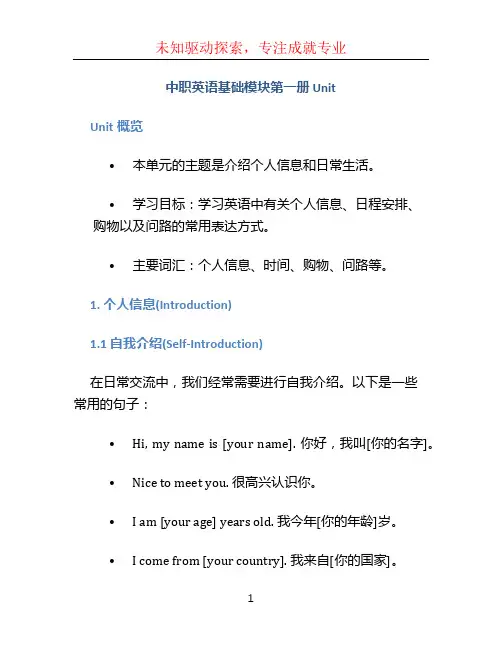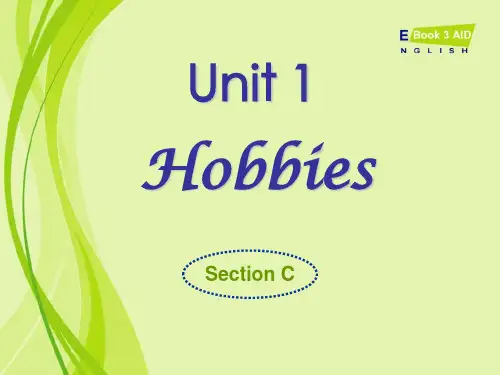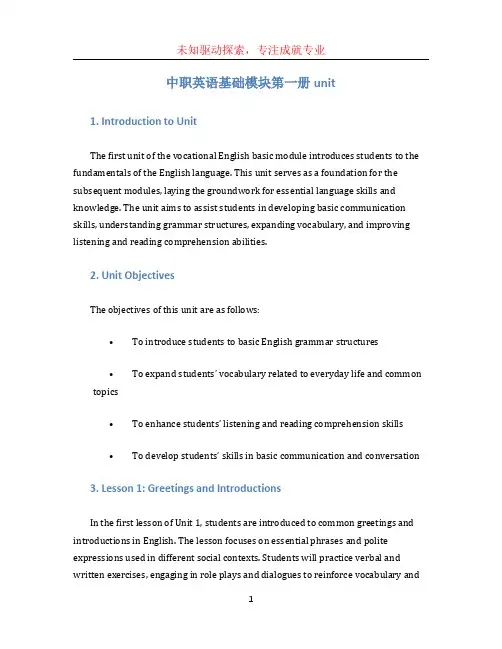中职英语第一册section C
- 格式:ppt
- 大小:7.20 MB
- 文档页数:30


中职英语基础模块第一册 UnitUnit概览•本单元的主题是介绍个人信息和日常生活。
•学习目标:学习英语中有关个人信息、日程安排、购物以及问路的常用表达方式。
•主要词汇:个人信息、时间、购物、问路等。
1. 个人信息(Introduction)1.1 自我介绍(Self-Introduction)在日常交流中,我们经常需要进行自我介绍。
以下是一些常用的句子:•Hi, my name is [your name]. 你好,我叫[你的名字]。
•Nice to meet you. 很高兴认识你。
•I am [your age] years old. 我今年[你的年龄]岁。
•I come from [your country]. 我来自[你的国家]。
•I am a student/worker. 我是一名学生/工作者。
•My hobbies are [your hobbies]. 我的爱好是[你的爱好]。
•I can speak [languages you speak]. 我会说[你会说的语言]。
1.2 个人信息(Personal Information)在日常生活中,我们会被问到一些个人信息。
以下是一些相关表达方式:•What is your full name? 你的全名是什么?•When is your birthday? 你的生日是什么时候?•Where are you from? 你来自哪里?•What is your phone number? 你的电话号码是多少?•What is your email address? 你的邮箱地址是什么?2. 日程安排(Scheduling)2.1 询问时间(Asking for Time)在日常生活中,我们经常需要询问时间。
以下是一些常用的句子:•What time is it? 现在几点了?•Do you have the time? 请问你能告诉我时间吗?•Could you tell me the time, please? 请问你可以告诉我时间吗?2.2 时间表达(Time Expressions)在安排时间时,我们需要使用一些时间表达方式。







中职英语基础模块第一册unit1. Introduction to UnitThe first unit of the vocational English basic module introduces students to the fundamentals of the English language. This unit serves as a foundation for the subsequent modules, laying the groundwork for essential language skills and knowledge. The unit aims to assist students in developing basic communication skills, understanding grammar structures, expanding vocabulary, and improving listening and reading comprehension abilities.2. Unit ObjectivesThe objectives of this unit are as follows:•To introduce students to basic English grammar structures•To expand students’ vocabulary related to everyday life and common topics•To enhance students’ listening and reading comprehension skills•To develop students’ skills i n basic communication and conversation3. Lesson 1: Greetings and IntroductionsIn the first lesson of Unit 1, students are introduced to common greetings and introductions in English. The lesson focuses on essential phrases and polite expressions used in different social contexts. Students will practice verbal and written exercises, engaging in role plays and dialogues to reinforce vocabulary andexpressions. The aim is to ensure that students are able to confidently greet and introduce themselves in various situations.4. Lesson 2: Numbers and DatesLesson 2 covers numbers and dates in English. Students will learn how to count and pronounce numbers, both cardinal and ordinal, from one to one hundred. Additionally, they will become familiar with different ways of expressing dates, including the day, month, and year format. The lesson includes interactive exercises to reinforce comprehension and practical applications of numbers and dates.5. Lesson 3: Family and RelationshipsIn Lesson 3, students learn vocabulary related to family and relationships in English. They will acquire the vocabulary necessary to describe family members, as well as phrases used to discuss relationships and personal connections. The lesson encourages students to engage in discussions about their own families and relationships, providing practical application of the vocabulary in real-life situations.6. Lesson 4: Daily RoutinesThis lesson focuses on daily routines. Students will learn vocabulary and expressions related to activities in their daily lives. They will practice discussing their daily routines and schedules, as well as forming sentences using appropriate verb tenses. The lesson incorporates various listening exercises and interactive activities to enhance understanding and usage of daily routine vocabulary and phrases.7. Lesson 5: Asking for and Giving DirectionsLesson 5 introduces students to vocabulary and phrases used when asking for and giving directions in English. Students will learn how to ask for and give various types of directions, such as asking for directions to a place or providing directions on a map. They will engage in role plays and practical exercises to reinforce their ability to understand and communicate directions effectively.8. Lesson 6: Time Expressions and AdverbsThe final lesson of this unit covers time expressions and adverbs. Students will learn to express specific times and durations using appropriate vocabulary and adverbial phrases. They will engage in listening exercises and writing tasks to reinforce their understanding and usage of time expressions and adverbs in context.9. ConclusionUnit 1 of the vocational English basic module provides students with a solid foundation in English language skills. By focusing on greetings, introductions, numbers, dates, family, daily routines, directions, and time expressions, students will develop essential communication skills necessary for various real-life situations. The unit aims to build students’ confidence in their ability to understand and use English in a vocational context.。


Unit11:Complete the dialogues.B:Hello! How are you?A:How are you?B:Good morning.A:It's really fun.2.Match.classroom. library. playgroundcanteen. dormitory. computer lab3.Answer the questions.⑴I think it's very large and beautiful.⑵Yes,there is.⑶Yes.I want to get good grades and gain some useful society skill.1.Pre-reading⑴The writer learns carrepairing.⑵The writer felt lonely and missed parents very much.⑶The writer has three classes in the morning. In the afternoon,the writer has practice classes.After class,the writer has many interesting activities.3.Fill in the blanks with the correct form of the words in the box.⑴Luckily ⑵vicational ⑶ repair ⑷concern ⑸adapt4.Write down your own school life plan.Another new term comes again,so I should have a school life plan to promote myself.Firstly,I decided to finish my homework carefully than before.And pay more attention to the know ledge.Secondly,I will do a lot of read to widen the range of my knowledge and try to combine thoerty to practice.Finally, I will learn to adjust,to be more positive and more helpful.That's what I plan to do in a new term.5.Practice⑴Are, am ⑵ are ⑶is ⑷are ⑸ is, is ⑹ Are ⑺ is ⑻isUnit 2 Warming-up 2. Parentschildrendaughter. son. wife. husbandchildrensister. brother3.Answer the questions.⑴ Four people. mother, father, brother and me.⑵Yes.we live in a woman home.⑶My father is a company clerk.4.Rewrite the sentences.How very lonely the little dog!What a beautiful rainbow!How handsome young man you are!Reading and Writing1.pre-reading(1)He raised four children.(2)Not only their “father”,but also their good friend.3.⑴plays with⑵real⑶toys⑷daughter⑸animals4.⑴children⑵sons daughter⑶girl⑷toy cars⑸EnglandGrammarpractice|.Choose the right pronoun to fill in each of the blanks.⑵her⑶your⑷their⑸This His⑹these⑺it⑻Your(9)mine(10)Its(11)me(12)her(13)which(14)it(15)Whom‖.Complete the questions to suit the answers.⑴Who⑵What⑶Whose⑷Which⑸WhoseUnit3Warming-upplete the dialoguesdose she go to the supermarket?I go to the supermarket every Friday.No,I don't.On Saturday night.2.Write the corret verbs under the e the verbs 1.get up 2.brush3.clean4.get5.make6.eat7.check8.say9.go3.Answer the questions.⑴At7o'clock.⑵I usually play the piano.⑶I read some books.Reading and Writing1.⑴People make great efforts to arrive on time.⑵It is expected that you call the person you are meeting.⑶Because they will not expect you to be there on the dot.3.⑴value ⑵appointment ⑶expected ⑷consider ⑸specific4.Dear Miss Tang,I'm sorry that I didn't go to the dancing class last night. Because I had to attend my grandma's birthday party. So I am sorry I could't come to class.I hope you can forgive me.Your StudentElisePractice⑴in ⑵for ⑶about ⑷on ⑸with⑹as ⑺for ⑻for (9)about (10)exceptunit4warming-up1.Would you like to go shopping with me?I'll see you tomorrow.2.⑴shopping mall ⑵book store ⑶department store⑷drugstore ⑸supermarket ⑹ bakery3.⑴Yes.I can buy some new clothes.⑵In shopping mall building.⑶Not often. Because I don't like reading.Reading and Writing1.⑴First,They feel safe. Then parking is usually free,and the weather inside is always fine. Last,the newest malls have beautiful rest areas with waterfalls and large green trees.⑵Edina,Minnesota.⑶Eat food,see movies,see a doctor or a dentist and even go to church.3.⑴shopping⑵mall⑶indoor⑷favorite⑸securityPractice⑴plays rained didn't play played⑵is makes made was was⑶am was mended cleaned watered cooked didn't wash washed feltUnit51.birthday partyThank you so much.Lily,nice to meet you,too.2.garden party birthday party weddinggraduation party cooktail party Christmas party3.⑴Yes,it's very fun.⑵In fact not.⑶First bring some gift such as a bottle of wine and chocolate.Second you should arrive on time.Third say something good about the dishes.After dinner don't stay too long.When leaving thanks the host again.Reading and Writing1.No2.Flowers,chocolate, a small gift, a thank-you note or telephone call after the visit3.You should tell those expecting you as far in advance as possible that you will not be there.3.⑴refuse ⑵attend ⑶appropriate ⑷responded⑸means4.Dear Elise,Christmas is coming.I am here sincerely to invite you to come to my party for Christmas at my home tomorrow.Food and drink will be adequately of fered and interesting games are avalible.With you a Merry Christmas!sincerelyGrammarPractice|.BACACBCA||.1.had finished2.had seen3.was reading4.has been5.would come back6.would go7.would have8.were cleaning9.had begun10.just have hadRevision |Comprenensive ExercisesA.1-5:CCBCB 6-10CBABA 11-15AAABBB.1-5BAAAC 6-10BBABCC one1 -5BABAC two 1-5CCBBAWritingA1. football as a hobby2.a member of3.must learn all the time within weeksBDear Peter,How's it going?On summer holiday my parents took me to Beijimg by plane.We went to the Great Wall.We also went to the Palace Museum.The last days,we went to the Summer Palace.I like this trip very much.I miss you so much. I hope you have a happy summer holiday.YoursUnit6Warming-up1.playing basketballHow about you?What do you think is the most important thing abou lose weight?I think you should.2.basketball tennis badmintonfootball volleyball the high jumpping-pong swimming gymnastics3.⑴Yes,especially good at badminton.⑵badminton⑶Do more exercise and have a healthy diet;Reading and Writing1.⑴Chinese eat a big meal for lunch but eat less at diner.Americans lunchtime is very quick. The dinner is well prepared and takes a long time.⑵Because they only have one or less than one hour for their lunch and have to go back to work or school.⑶It as a way to take a good rest after a long,hard day of work.3.⑴on a diet ⑵differs⑶anything but⑷rude⑸saying4.We know that some of our students do not like eating lunch at school because the food isn’t delicious. So they often go out of school to buy something they like to eat. But I’m afraid it’s bad for their health to eat lunch outside because some of the food they buy isn’t healthy eno ugh.In my opinion, if our schools want more students to be back and enjoy lunch inside, they should make the food more delicious, and also they should offer our students a larger choice of food as well.GrammarPractice1-5BADDB 6-10CDDBBUnit7Warming-up1.The first room on your left. Thank you very much.2.⑴in the box ⑵on the box⑶in front of the box ⑷behind/in back of the box⑸under the box ⑹next to the box⑺between the two boxes⑻across from the box3.⑴Between the teaching building.⑵I used to get lost in a strange city.⑶I'll ask some pedestrians.Reading and Writing⑴The writer being a volunteer in the 2008 Olympics.⑵Because the writer has the chance to show our traditional culture,strength and friendliness to the whole world.⑶The writer provided some shelves to keep the things of the audience later.3.⑴proud ⑵disasters⑶cooperation⑷crashed⑸gained4. When I was young,oneday I assembled the airplane model.Two hours later I still didn't finish it.I was a little bit out of patience.When I was about to give up, my father came in my room.He asked me for a reason, and encouraged me.He told me to do anything to be patient.At last, I finished the model with his patience.I looked at the model and felt particularly proud.I understood the importance of patience in this matter.So in later days whenever I'm in trouble, I tell myself to be patient. Grammar⑴SVO⑵SVOC⑶SVIODO⑷SVO⑸SVOC⑹SLP/SVP⑺SVOC⑻SVIODO(9)SVO(10)SLP/SVPUnit8Warming-up1.What's the matter with you?Have you ever seen a doctor?I have a cold.have a good rest2.cough. toothache. headache. sneeze3.⑴st year I had a heavy cold.⑵Clothes less or eat cold food.⑶I usually go to hospital.Reading and Writing1.⑴Because they believe such testing is unnecessary.⑵Scientists in medical labs know that if the medicine work with animals can also work with people.⑶Ithink animals have the same rights.Because we live together on the earth.3.⑴live ⑵effect ⑶necessary ⑷meet ⑸against4.Dear Miss Lee,I'm sorry that I couldn't go to the computer classes last night.I had a bad cold last night.My mother took my temperature and my temperatue was high.My mother took me to go to the doctor.The doctor told me that I should stay at home and have a good rest for 2 days.So,I have to ask for two days leave from school.Thank you.YoursElise Macth 12th Grammar1-5BCBAB 6-10DCCBAUnit9Warming-up1.Merry Christmas!I like it very much.Happy New Year!Thank you!2.Saint Patrick's Day Mid-Autumn Festival Christmas DaySpring Festival Easter HalloweenLantern Festival Dragon Boat Festival Valentine's Day3.⑴Have a meal with a big family.⑵Dragon Boat Festival⑶I'm going to eat rice dumplings and watch the dragon boat races.Reading and Writing1.⑴Easter⑵The custom of giving gifts and the habit of family union.⑶Whit Sunday falls on the seventh Sunday after Easter.3.⑴chief ⑵decorate ⑶patriotic ⑷ceremony ⑸hangs4.Season's greetings and sincere wishes for a bright and happy New Year! Wishing you happiness during the holidays and throughout the New Year.Good luck, good health, hood cheer. I wish you a happy New Year!GrammarPractice|. written had given studied put made played helped begun known said read cut done seen||.⑴was broken⑵be mixed⑶was seen⑷was stored⑸were collected⑹is added⑺were read⑻was used(9)was built(10)will be finishedUnit 10Warming-up1.What were you doing just now?What time shall we meet?What's your holiday plan?Have fun!2.Spring Autumn Summer Winter3.⑴Hawaii,Bali ,etc.⑵Shanghai Because it is an international big city.⑶It is a typical outdoor sports and leisure sports.Reading and Writing1.⑴Yes.Jiuzhai Valley,the Great Wall,the Summer Palace .⑵Often we journey in search of something of ourselves,love adventure, understanding,the place we belong to.⑶Yes.We travel and travel in order to find our partners and our spiritual home.3.⑴desperately⑵share⑶adventure⑷unforgettable⑸stand4. I wish I could have an ideal residence where is an good green environment, a nice convenience store where I can buy a fresh vegetables and fruits everyday.A clean, quiet and neat place, no air pollution and water pollution, no garbage on the ground,no noisy around, no dog shit everywhere, a enjoyable, viewable view, visual qualities and walkable park in the community, a beautiful bridge over across a clean fish pond with manmade fountain an mountain.GrammarPractice|.⑴Dose Mr.Zhang is a worker?Mr.Zhang isn't a worker .⑵Dose Thomas listen to music every evening?Thomas doesn't listen to music every evening.⑶Do they clean their classroom once a week?They don't clean their classroom once a week.⑷Did you do your homework yesterday afternoon?I didn't do my homework yesterday afternoon.‖⑴What do you see in the picture?⑵What day is day?⑶What color is your coat?⑷How does he usually go home?⑸Who is Mike?⑹Whose kite is that?⑺How much is this TV set?|||⑴isn't she?⑵isn't he?⑶did they?⑷are you?Revision‖A1-5AACAC 6-10ACBAA 11-15CAACAB1-5ABCCB 6-10BCBABC one1-5CBABA two1-5BCBBCWritingA1.I have time?2.was expected3.isB Dear Xiaohong,I will go to Shanghai next week. Would you please book a hotel room for me? I'd like a single room with bath. And it better be located in the center of the city. I will arrive on Jan. 5, and stay there for a week. Thank you very much for the trouble. See you then.Yours sincerely,Li Mingming。